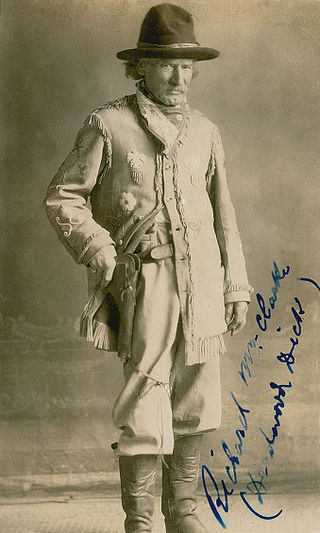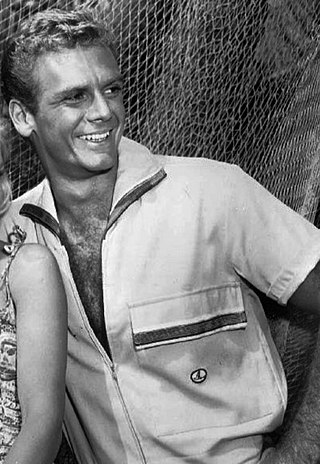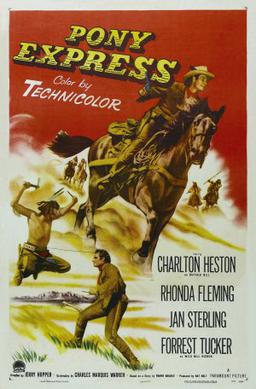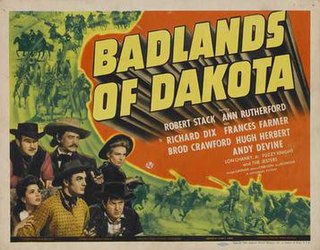Plot
After being taken prisoner by Crazy Knife and a band of Cheyenne warriors, Wild Bill Hickok's life is spared by Chief Black Kettle, but when he is set free, it is without his horse and his boots.
Calamity Jane, driving a stagecoach, gives Hickok a ride back to the fort, where Lt. Stiles of the Army seems indifferent to Hickok's warning that the Cheyenne are now armed with repeating rifles. At the saloon, where Wild Bill renews an acquaintance with old friend Buffalo Bill, he spots a gambler named Lattimer cheating at poker and deals with him accordingly.
Crazy Knife and his men take Calamity Jane captive, and Lattimer turns out to be the one supplying them with the rifles. Hickok manages to save Jane, who loves him, and the fort ends up with a new officer in command, General Custer.

The Cheyenne are an Indigenous people of the Great Plains. The Cheyenne comprise two Native American tribes, the Só'taeo'o or Só'taétaneo'o and the Tsétsėhéstȧhese ; the tribes merged in the early 19th century. Today, the Cheyenne people are split into two federally recognized nations: the Southern Cheyenne, who are enrolled in the Cheyenne and Arapaho Tribes in Oklahoma, and the Northern Cheyenne, who are enrolled in the Northern Cheyenne Tribe of the Northern Cheyenne Indian Reservation in Montana. The Cheyenne language belongs to the Algonquian language family.

William Frederick Cody, known as Buffalo Bill, was an American soldier, bison hunter, and showman.

James Butler Hickok, better known as "Wild Bill" Hickok, was a folk hero of the American Old West known for his life on the frontier as a soldier, scout, lawman, cattle rustler, gunslinger, gambler, showman, and actor, and for his involvement in many famous gunfights. He earned a great deal of notoriety in his own time, much of it bolstered by the many outlandish and often fabricated tales he told about himself. Some contemporaneous reports of his exploits are known to be fictitious, but they remain the basis of much of his fame and reputation.

Black Kettle was a leader of the Southern Cheyenne during the American Indian Wars. Born to the Northern Só'taeo'o / Só'taétaneo'o band of the Northern Cheyenne in the Black Hills of present-day South Dakota, he later married into the Wotápio / Wutapai band of the Southern Cheyenne.

The Battle of the Washita River occurred on November 27, 1868, when Lt. Col. George Armstrong Custer's 7th U.S. Cavalry attacked Black Kettle's Southern Cheyenne camp on the Washita River.

The Battle of Warbonnet Creek was a skirmish characterized by a duel between "Buffalo Bill" Cody and a young Cheyenne warrior named Heova'ehe or Yellow Hair. The engagement is often referred to as the First Scalp for Custer. It occurred July 17, 1876, in Sioux County in northwestern Nebraska.

Charles H. "Colorado Charlie" Utter was a figure of the American Wild West, best known as a great friend and companion of Wild Bill Hickok. He was also friends with Calamity Jane.

Buffalo Girls is a 1990 novel written by American author Larry McMurtry about Calamity Jane. It is written in the novel prose style mixed with a series of letters from Calamity Jane to her daughter. In her letters, Calamity describes herself as being a drunken hellraiser but never an outlaw. Her letters also describe her larger-than-life cohorts.

The Plainsman is a 1936 American Western film directed by Cecil B. DeMille and starring Gary Cooper and Jean Arthur. The film presents a highly fictionalized account of the adventures and relationships between Wild Bill Hickok, Calamity Jane, Buffalo Bill Cody, and General George Custer, with a gun-runner named Lattimer as the main villain. The film is notorious for mixing timelines and even has an opening scene with Abraham Lincoln setting the stage for Hickok's adventures. Anthony Quinn has an early acting role as an Indian. A remake using the same title was released in 1966.

Richard Clarke, born in Yorkshire, England, was a United States frontiersman, Pony Express rider, actor, and armed forces member who was widely considered by the American public to be the original inspiration for Deadwood Dick.

Fort Hays, originally named Fort Fletcher, was a United States Army fort near Hays, Kansas. Active from 1865 to 1889 it was an important frontier post during the American Indian Wars of the late 19th century. Reopened as a historical park in 1929, it is now operated by the Kansas Historical Society as the Fort Hays State Historic Site.

Harry Guy Stockwell was an American actor who appeared in nearly 30 movies and 250 television series episodes.

Wild West shows were traveling vaudeville performances in the United States and Europe that existed around 1870–1920. The shows began as theatrical stage productions and evolved into open-air shows that depicted romanticized stereotypes of cowboys, Plains Indians, army scouts, outlaws, and wild animals that existed in the American West. While some of the storylines and characters were based on historical events, others were fictional or sensationalized.

Custer's Last Stand is a 1936 American film serial based on the historical Custer's Last Stand at the Little Bighorn River. It was directed by Elmer Clifton, and starred Rex Lease, William Farnum and Jack Mulhall. It was produced by the Poverty Row studio Stage & Screen Productions, which went bust shortly afterwards as a victim of the Great Depression. This serial stars many famous and popular B-Western actors as well as silent serial star Helen Gibson playing Calamity Jane, Frank McGlynn Jr. as General Custer, and Allen Greer as Wild Bill Hickok.

The Great Sioux War of 1876, also known as the Black Hills War, was a series of battles and negotiations that occurred in 1876 and 1877 in an alliance of Lakota Sioux and Northern Cheyenne against the United States. The cause of the war was the desire of the US government to obtain ownership of the Black Hills. Gold had been discovered in the Black Hills, settlers began to encroach onto Native American lands, and the Sioux and the Cheyenne refused to cede ownership. Traditionally, American military and historians place the Lakota at the center of the story, especially because of their numbers, but some Native Americans believe the Cheyenne were the primary target of the American campaign.

Martha Jane Canary, better known as Calamity Jane, was an American frontierswoman, sharpshooter, and storyteller. In addition to many exploits, she was known for being an acquaintance of Wild Bill Hickok. Late in her life, she appeared in Buffalo Bill's Wild West show and at the 1901 Pan-American Exposition. She is said to have exhibited compassion to others, especially to the sick and needy. This facet of her character contrasted with her daredevil ways and helped to make her a noted frontier figure. She was also known for her habit of wearing men's attire.

Pony Express is a 1953 American Western film directed by Jerry Hopper, filmed in Kanab, Utah, and starring Charlton Heston as Buffalo Bill, Forrest Tucker as Wild Bill Hickok, Jan Sterling as a Calamity Jane-type character, and Rhonda Fleming. The story is largely based on the 1925 silent film The Pony Express while the threat of a Californian secession is taken from Frontier Pony Express (1939).

The Raiders is a 1963 American Western film directed by Herschel Daugherty and written by Gene L. Coon. The film stars Brian Keith, Robert Culp, Judi Meredith, Jim McMullan, Alfred Ryder and Simon Oakland. The film's working title was "The Plainsman," and it was apparently intended as a spin-off of that 1936 classic.

Badlands of Dakota is a 1941 American western film directed by Alfred E. Green and starring Robert Stack, Ann Rutherford, Richard Dix and Frances Farmer. Its plot follows a sheriff and his girlfriend who cross paths with Wild Bill Hickok and Calamity Jane.



















